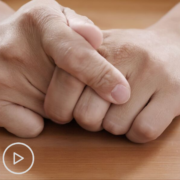Why You Need a CLL Specialist
vWhy You Need a CLL Specialist from Patient Empowerment Network on Vimeo.
Why should you seek care with a CLL specialist? Dr. Brian Hill outlines the benefits of seeing a CLL expert and advice for approaching a second opinion. Need help speaking up? Download the Office Visit Planner and bring it to your next appointment here.
Dr. Brian Hill is the Director of the Lymphoid Malignancies Program at Cleveland Clinic. More about this expert.
See More From The Pro-Active CLL Patient Toolkit
Related Resources

|

|

|
Transcript:
Dr. Brian Hill:
Patients should consider seeing a CLL specialist because oncology is a very complicated field. There are many different types of cancers that oncologists treat. And particularly in smaller hospitals, maybe with general oncologists who see lung cancer, colon cancer, breast cancer and CLL as well as many other types of – patients with many other types of problems. It’s very difficult to stay 100% up to date on all those fields. All of oncology is very rapidly evolving.
And the progress that’s being made in all the diseases I mentioned is very fast paced. And so, things change. And there’s new data emerging all the time. And CLL specialists or lymphoma specialists are able to stay more up to date on these topics. And usually that can result in maybe better options for patients.
So, we often get second opinions or third opinions for patients with CLL.
And one of things patients are understandably concerned about sometimes is the impact this will have on their primary oncologist. Maybe they are from a smaller town or have a smaller hospital. They have an oncologist, hematologist, gynecologist who they like, and they trust, and they don’t want to hurt their feelings or damage the relationship because they may need their primary or local hematologist, oncologist to help them if they are sick or something goes wrong.
So, I think that most oncologists recognize that – again, the field is very complicated. And it’s common for people to seek opinions from referral centers. So, I would say the best thing is to be up front about it. And explain to their primary that it’s not that they don’t like them or don’t trust them.
But it’s important – it’s their health. And they really want to make sure they have another set of eyes. And I even sometimes encourage my own patients that if they have questions about what I’m talking to them, to welcome another opinion. And if there’s good communication about it, I don’t think that you should be concerned about the sort of hurt feelings aspect of it.










